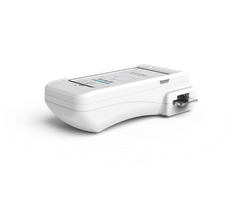
iFirst Analyzer
“COVID-19 poses a grave danger to public health here in the U.S. and around the globe,” said Luke Joseph, CEO of iFirst. “We at iFirst are compelled to act. Broad-based testing and on-the-spot results promise to slow the spread and save human lives.”
HONOLULU (PRWEB)
March 26, 2020
iFirst Medical Technologies, Inc., a leader in handheld diagnostic devices, announced today that it has begun rapid development of COVID-19 nasal swab test.
“COVID-19 poses a grave danger to public health here in the U.S. and around the globe,” said Luke Joseph, CEO of iFirst. “We at iFirst are compelled to act. Broad-based testing and on-the-spot results promise to slow the spread and save human lives.”
iFirst has begun rapid development of a nasal swab test for use with the handheld iFirst Analyzer™ to detect severe acute respiratory syndrome coronavirus 2 (SARS-CoV-2), the virus that causes COVID-19.
Upon successful validation of its COVID-19 Test, iFirst plans to seek Emergency Use Authorization from the U.S. Food and Drug Administration.
The iFirst Analyzer is a handheld diagnostic device, with onboard chemistry and optical analytics. It also has integrated GPS and wireless transmission of results to the iFirst Cloud™, enabling effective public health surveillance. This takes the form of real-time, automated reporting and mapping of outbreak hotspots, informing authorities and enabling better containment of the spread of an epidemic or a pandemic.
Critical use cases include ports of entry and enabling health care workers to evaluate and test quarantined patients in their homes. Mobile, in-home testing would ease the burden on clinics and hospitals as well as lessen the risk of social spread of disease.
iFirst has engaged Underwriters Laboratories and expects to complete UL testing and CE mark certification of the iFirst Analyzer during the second quarter of 2020. The CE mark indicates that a product may be sold freely in any part of the European Economic Area, irrespective of its country of origin.
Prior to COVID-19, the world has experienced threats from coronaviruses including SARS in 2003 and MERS in 2012. The underlying science used in the development of the test to detect SARS-CoV-2 (which causes COVID-19) enables rapid development of tests for the unfortunate reality of future coronaviruses.
Honolulu-based iFirst is collaborating with researchers at the University of Hawai’i John A. Burns School of Medicine (JABSOM). The company’s iFirst Analyzer technology has been bench tested at JABSOM as well as Cedars-Sinai Medical Center in Los Angeles, California.
In 2017, the iFirst Analyzer was recognized by NASA iTech as one of the Top 10 technologies that are solving problems on Earth and have the potential to address existing challenges to enable NASA missions.
“iFirst is on the forefront of diagnostic technology, with research and development that saves lives and advances humanity,” said Kevin Lye, M.D., the company’s Chief Medical Officer. “With our Coronavirus Detection Initiative, we aim to work with governments and healthcare providers to slow the spread of COVID-19 and future coronaviruses.”
iFirst is a privately held company, with backing from two Honolulu-based institutional investors, Markowitz Trust and Blue Startups. Funding for the early prototype iFirst Analyzer came from a roughly $1 million grant from the U.S. Army.
To accelerate test development, iFirst is seeking grants from governments, non-governmental organizations (NGOs) and private foundations. The company also invites collaboration with like-minded, innovative businesses. Find more info at https://www.ifirstmedtech.com/covid-19
About iFirst
iFirst Medical Technologies, Inc. is a leading developer of handheld diagnostic devices. The company’s critically acclaimed iFirst Analyzer™ employs onboard chemistry, optical analytics, GPS and wireless transmission of patient data to the iFirst Cloud™. iFirst has been recognized by NASA iTech (2017) as one of the Top 10 technologies solving problems on Earth with potential for future space missions. Headquartered in Honolulu, the company is privately held and backed by local institutional investors. Early prototyping was funded by a roughly $1 million grant from the U.S. Army.
Share article on social media or email:

